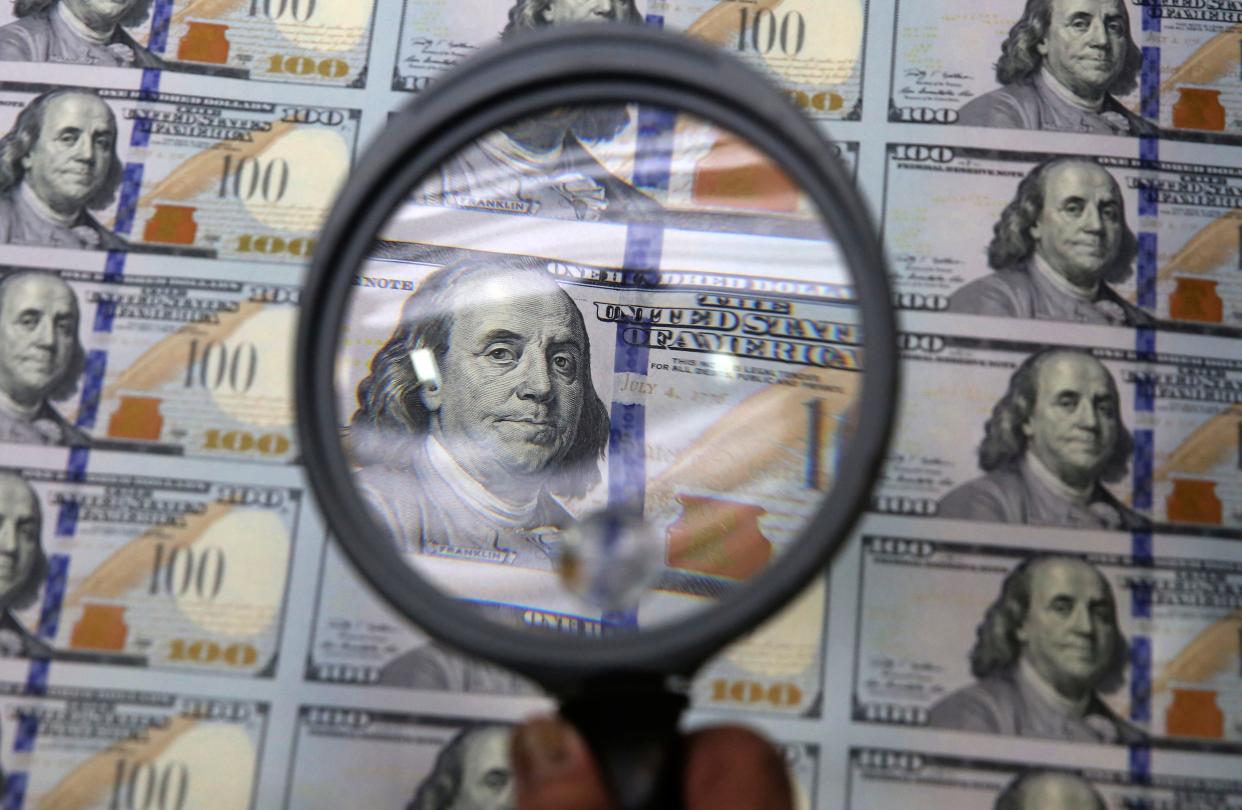Congress ignored warnings about its pandemic spending. Now the bill is coming due

- Oops!Something went wrong.Please try again later.
As worries about COVID-19 soared in March 2020, the U.S. Congress passed an unprecedented $2 trillion relief package.
With little debate, they pushed through the Coronavirus Aid, Relief and Economic Security (CARES) Act, which was quickly signed by President Trump.
“We’re going to take up and pass this package to care for those who are now caring for us,” Senate Majority Leader Chuck Schumer said, “and help carry millions of Americans through these dark, economic times.”
Trump crowed at the signing ceremony, thanking “Democrats and Republicans for coming together and putting America first.” He joked, “I’ve never signed anything with a T [for trillion].”
Congress spent big, without safeguards
One section of the CARES Act doled out unemployment payments to the many who lost their jobs in the early weeks of the pandemic. The federal government added $600 in weekly benefits, an amount later reduced to $300. The extra payments lasted as long as 79 weeks.
D.C.’s “spend first, ask questions later” legislation did nothing to prevent fraud, an oversight many observers warned would bite taxpayers in the long-term.
Today, the bill is coming due.
On Tuesday, the Government Accountability Office announced that between $100 billion and $135 billion was wasted on fraudulent unemployment claims. This adds up to about 15% of all the benefits issued.
The total is double the amount the GAO estimated in a February report to the House Ways and Means Committee. Even so, the multibillion total is just a guesstimate.
“The full extent of [unemployment] fraud during the pandemic will likely never be known with certainty,” the GAO stated in their report.
Pandemic relief was rife with fraud
This staggering amount of fraud only addresses one of the many high-ticket initiatives Congress passed during the frenetic early days of COVID-19. The mandate was to “do something fast” rather than “do something well.”
States have reported they’ve recovered only $1.2 billion in fraudulent payments, less than 1% of the total damage. We the people are on the hook for the rest.
Keep in mind the U.S. national debt is nearing $33 trillion, or about 120% of the U.S. gross domestic product.
On Labor Day, Biden bragged, “I cut the deficit $1.7 trillion” last year. For some reason he forgot to mention that this year’s deficit is expected to double with an increase of about $1 trillion.
National debt is huge: Why politicians refuse to talk about it
A trillion here, a trillion there can really add up.
Sen. Mike Crapo, R- Idaho, and Rep. Jason Smith, R-Mo., requested the GAO study and were stunned at the high price tag.
Both parties added to this debt
Rep. Smith, chairman of the House Ways and Means Committee, called the estimated fraud “the greatest theft of taxpayer dollars in American history.”
I don’t know if it’s the “greatest” — there’s $33 trillion worth of overspending with both parties’ fingerprints all over it.
Back in 1988, the Democratic Party Platform said Republicans had “mortgaged our children's future by tripling our national debt.” At that time, it was a quaint $2.7 trillion.
In 1996, the Republican Party Platform proclaimed, “We have a moral responsibility not to leave our children a legacy of monstrous debt.” The total then was $5 trillion.
I guess our “children’s future” and our “moral responsibility” doesn’t matter much these days.
Occasionally, a brave senator or representative will point out the tsunami of red ink flowing from the Potomac. Kudos to Sen. Crapo and Rep. Smith for highlighting this latest scandal.
But most politicians have quietly agreed to increase the debt, year in and year out, until the entire artifice collapses from its own weight.
If you thought 2008’s housing bubble was bad, wait until the debt bubble bursts.
Jon Gabriel, a Mesa resident, is editor-in-chief of Ricochet.com and a contributor to The Arizona Republic and azcentral.com. On Twitter: @exjon.
This article originally appeared on Arizona Republic: Congress spent big on pandemic relief. Now, taxpayers must pay

